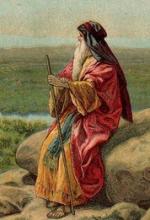Shabbat Shalom and welcome to Judeo Talk. The Torah portion for this week is Parsha V'Zot Ha'Berachah, Deuteronomy 33:1-34:12.
This week's parsha is the final portion of the Five Books of Moses. In it, Moses stands before all of the Israelites and says his final words, a blessing to each of the twelve tribes. He enumerates the essence of what those tribes represent and the nature of the path each of them will follow in the days to come.
What is so striking about this parsha is that, for all the grumbling and anger of the past, Moses is leaving his people with words of love and appreciation. He is a father figure of sorts, looking out on all the children he raised and being proud of them despite the growing pains and problems of the past.
Moses is the closest thing Judaism has to a great, heroic figure. He is not without his faults and his mistakes, has been dreadfully wrong and even sinful over his long years in life, but the Torah still holds him in high regard. The question we must ask ourselves in these closing moments of our central scriptures is what exactly does Moses represent for us today? He is not a king or a priest. He is not magical or of any particularly grand lineage. What value does the figure of Moses have to modern people?
Ultimately, we need only look at other great figures from history to understand what Moses is to any culture that learned about him. He has come to be associated with liberators like Harriet Tubman and Martin Luther King Jr. We see Moses, who the Torah summarizes an unparalleled man of God, in leaders who we believe embody the epitome of righteousness and social justice without seeming particular super-human, either.
Unlike the central figures of other major faiths, Moses is overtly flawed. He is far from Christ-like perfection and infinite patience, he is possessed of only a fraction of the wisdom of Buddha or the steely leadership of Mohammed. Moses is a leader, whether he likes it or not, but he still needs a lot of help from both God and other good people. If the Torah posits Moses as the best possible man of his time, it does so with an overarching philosophy of earthly imperfection. We must all certainly aspire to be Moses-like in our courage and devotion, but we are all inevitably Moses-like in our flaws and ignorance.
So, this is how the Torah closes its central story, with the well-wishes of its best but certainly imperfect man. This places the responsibility of the law and the future on all of us, the descendants if not in body than in spirit of the people who crossed over into the Promised Land.
But that in itself is a quirk of the Tanakh. In the Five Books we never actually witness the Israelites enter into the Holy Land and I do believe this is entirely intentional. Moses spends his last moments talking about the strengths of each tribe, but those are just sentiments. If the Torah is a story about the struggle to be righteous and holy, it is also a story that has no real conclusion. This is where we stand, now and for the rest of our lives- At the border of Zion. We stand without the leaders and parents of our pasts, bearing the full weight of all our decisions. The best any of us can ever be is incomplete and imperfect, but we can still achieve enough good to have made the world better. We are all Moses floating down the Nile in a basket, each of us at once royalty and slaves. The substance of our days depends on what we choose along the way.
